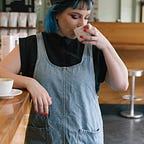The specialty coffee industry has a gender problem.
Last week I landed myself in the middle of a heated debate on the lack of female barista champions through a question I posed on social media.
Being no stranger to controversy because of the challenging topics I choose to share and engage with, I was shocked at the avalanche of responses from people with an opinion on the subject.
I posed the question after spending a few days in Bergen for Easter, when I was approached by one of the organisers for the regional competition to judge. When I declined because of a flight back to Oslo that afternoon, I asked if she was going to be competing herself and was met with the response that I would often give when others would pose the same question to me. A guffaw and a shrug, then a couple of sentences about how it was not likely she would have the time, energy and resilience to stress to enter.
Being an avid supporter of women working in coffee, it was disappointing to hear her say it but not surprising. It seemed like she was talented and had something important to share with the wider community.
Similarly, I had judges vocally voice their disappointment when I left the competition scene in 2009, after taking 3rd place in the Victorian regionals. Saying that if only I persevered, I would succeed. But the bravado my male counterparts displayed was overwhelming to my tired and overworked self and I went back to my job managing two successful cafes and moved on.
This conversation reminded me of the recently published study regarding the gendered behaviour in job applications. It found that men were likely to apply for positions when they only possessed 60% of the qualifications, whereas women would only apply if they had 100%. It tends to support the notion that men are hired on potential whereas women are hired on experience.
The tendency to raise boys to take risks and girls to be perfect is a wider societal issue that clearly affects the way we apply for jobs. But when our industry idolises champions in ways that never could be achieved through career paths and hard work alone, having a system that obviously favours men, is narrow minded and damaging.
Have the rules of the World Barista Competition morphed over the years to reward the brave? This could be the reason we’ve seen zero female champions.
I am not suggesting that sexism is writ into the structure of the competition, merely stating the notion that if winners dictating the future and direction of the event, it will begin to reflect their perspective in one form or another.
Coffee is not the only industry with a gender problem. In 1997 a paper was published addressing gender bias in the method orchestras were employing to audition musicians. They found that even of the clacking of heels behind a screen was enough to influence the people hiring into disregarding the value of a female musician. Once they removed all the indication of gender during auditions, orchestras that once had less than 10% of female musicians, dramatically increased to almost 50%.
For those that argue that the WBC is reflective of merit, I’ll quote writer Laurie Penny:
“If you think that a truly meritocratic society would not be one in which men and women were equally represented, from politics to pop culture, what you’re saying is that men are fundamentally better than women.”
Perhaps we need to start by building infrastructure that nurtures women into higher positions. Perhaps we too need to have blind performances. All I know is that by lacking female role models, less women will want to be involved and the more of a circle jerk this industry will become.
“ A lack of visible role models reduces a person’s confidence in their ability to undertake a role. This lack of confidence, in turn, can create stress that reduces performance and, separately, it can result in gender-biased assessments of “merit”. It also reduces the attractiveness of the career as a choice. So the fewer women leads to fewer women leads to fewer women…”
-Emma Johnston.
By encouraging more diversity in our industry, the tapestry of knowledge we possess is so much greater. What we are able to achieve will be more profound and the prouder we can be of what we do.
